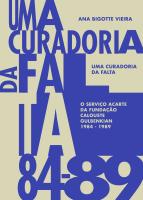Calouste Gulbenkian Foundation
Articles tagged with Calouste Gulbenkian Foundation
Tag Archive
- A House in Luanda
- activists
- african studies
- angolan cinema
- angolan identity
- angolan music
- António Ole
- Arte Contemporênea
- artists
- association tchiweka de documentation
- Ateler Mutanba
- Berlin
- black is beautiful movement
- British media
- Cameroon
- cannibal museology
- Carlos Nô
- cc
- Ceramics
- Cheryl Dunye
- Claire
- controversy
- cores
- coronavirus
- crise
- David Adjaye
- departures
- Descolonizing Decolonization
- design
- direitos humanos
- eleições
- factory of disposable feelings
- far-right
- Fernando Anuang´a
- fotography
- freedom
- gender
- Guiné-Bissau
- indentity
- intellectuals
- Jeane terra
- Jeux Sans Frontières
- judith butler
- kilimanjaro
- labourers
- Leila Kilani
- LGBTQI
- língua
- Lisboa e Paraíso
- Lunda
- Luso-Tropicalism
- Lusophone films
- lyubov matyunina
- Macau
- mamela nyamza
- Marielle
- Marsha P. Johnson
- memoirs
- mexican
- micro-política
- Mississippi
- Moira Millán
- Monuments
- myth
- nationalists
- New Encyclopedia of Africa
- Noz de cola
- ocupações temporárias
- PAIGC
- painting
- palestina
- Parangolé
- Pedro Neves Marques
- poesia caboverdiana
- police
- Portraits
- produção audiovisual brasileira.
- Projeto Popular
- pscianálise
- queer
- racismo estrutural
- Roberto Conduru
- RUI MAGALHÃES
- sexual harassment
- social construct
- space
- stone lessons
- surname
- territory
- The Mechanics of the Ephemeral
- The Party of the Dead
- The Sudanese Revolution
- transatlantic slave trade
- Trump
- turismo
- ultramar
- urban africa
- violencia
- Vitor belanciano
- war
 The questions raised by Ana Bigotte, on the contrary, are not formulated in the strict disciplinary framework of art history, but from the porous and open framework of theory and cultural studies, taking as fundamental references the work of authors such as Luís Trindade or Boaventura de Sousa Santos, whose object goes beyond the specific sphere of the artistic to approach culture as a social process with multiple branches. It does so by following the path opened by André Lepecki, who formulated interesting hypotheses about the construction of the Portuguese social "body" from the study of dance and performance. This is another distinctive specificity of the Portuguese case that contrasts with that of the neighboring country: the focus on the arts of the body and the so-called "living arts", such as theater, dance, and music.
The questions raised by Ana Bigotte, on the contrary, are not formulated in the strict disciplinary framework of art history, but from the porous and open framework of theory and cultural studies, taking as fundamental references the work of authors such as Luís Trindade or Boaventura de Sousa Santos, whose object goes beyond the specific sphere of the artistic to approach culture as a social process with multiple branches. It does so by following the path opened by André Lepecki, who formulated interesting hypotheses about the construction of the Portuguese social "body" from the study of dance and performance. This is another distinctive specificity of the Portuguese case that contrasts with that of the neighboring country: the focus on the arts of the body and the so-called "living arts", such as theater, dance, and music. 